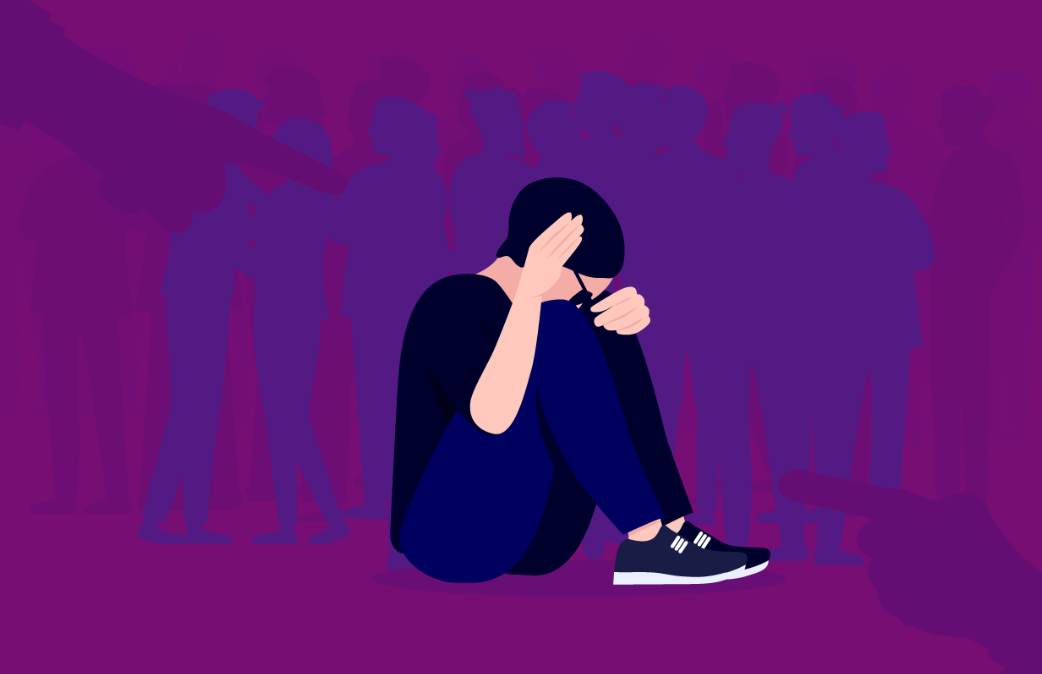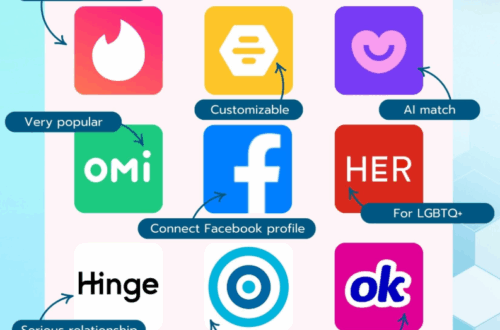You notice your face turning red, your voice shaky, and your hands sweating. You feel like everyone in the room is staring at you and you just want to sink into the ground. Your thoughts are racing: ” Calm down! It’s not as bad as it seems, is it? ” says the critical voice in your head. But of course that only makes things worse. A real vicious circle.
If you’re familiar with this or a similar situation, then you’re probably a shy person who doesn’t particularly like being the center of attention. However, these ultimately unnecessary states of anxiety are anything but pleasant and in some situations they only make your life unnecessarily difficult.
That’s why you’ll learn here how to work on shyness and overcome it
Here we will look in detail at how you can overcome your shyness and at the same time build more self-confidence and self-esteem so that such unpleasant situations are a thing of the past forever.
The 4 psychological causes of shyness
Shyness often develops in childhood or as a result of our upbringing. For example, if your parents scolded you for mistakes instead of showing understanding and calmly explaining how you could do something better. Or if your parents only ever rewarded you for good performance but never appreciated an honest attempt.
This kind of thing erodes our self-esteem and self-confidence enormously and thus promotes the development of shyness! But that alone is rarely the only cause of shyness. So let’s first look at the four most common/biggest causes of shyness before we delve deeper into how to overcome shyness in the next step.
Cause 1: Lack of self-confidence
Shy people are often afraid of not being able to do something. ” I just can’t get a straight sentence out when I’m talking to a woman. ” ” I can’t give a presentation without stuttering. ” The fear of failure or making a mistake then leads to the symptoms of shyness and insecurity becoming even worse .
The nasty thing about shyness is that it makes you forget all your talents and abilities in the moments when it matters most, and as a result, you suddenly seem to lack self-confidence .
So even if you stumble over something during a presentation, for example, don’t lose your sense of humor at that moment. You can use this to your advantage. But to do this, you have to remember your abilities in order to be able to draw more self-confidence from them .
Cause 2: Low self-esteem
Maybe your parents often criticized you for being so “quiet .” Or maybe they didn’t give you enough chances to express yourself freely. Our personality is often an adaptation to our environment. If everyone around you was loud and maybe even mean, then it was only logical for you to be more reserved.
Maybe you are one of the many people who think that shyness is a bad thing. But imagine if everyone wanted to be the center of attention all the time. That would be a really loud world, and ultimately there would be no center of attention at all. Because if everyone was loud, who would be able to listen?
And shyness isn’t an illness, it’s a simple personality trait. Shyness and introversion often go hand in hand. Introverts tend to be reserved and prefer to listen rather than speak themselves. So it’s not about getting rid of your shyness, it’s more about developing a better way of dealing with your shyness in order to make your life easier and to build a stronger personality .
Cause 3: The fear of making mistakes
If you had particularly critical parents, you may be very afraid of making mistakes. Perhaps your mistakes were criticized so often that you believe you ‘re not allowed to make them. In this case, it’s important to unlearn your fear of making mistakes .
Learn to see mistakes as an important tool in your personal development
Keep telling yourself that mistakes are absolutely okay and even important for learning. Be an encouraging parent to yourself, lovingly telling yourself, “Try again. Next time, you’ll get better!”
If you stumble or lose track during a presentation, that’s perfectly fine and normal. The important thing is that you keep going! And luckily, your critical parents aren’t even present at your work presentation.
Cause 4: Fear of rejection
Your childhood may have left its mark here too. As a child, it is of course incredibly difficult to experience rejection. After all, we are dependent on our parents and the community.
A little excursion into evolutionary psychology: rejection activates the pain center in our brain. This means that when you experience rejection, the information in your brain is the same as if someone punched you in the stomach.
The classic horror scenario is, of course, being laughed at. Being the center of attention and everyone around you pointing their fingers at you and laughing. And then they never want to have anything to do with you again. But seriously: this situation is extremely, extremely unrealistic and there is a 99.98% probability that this will never happen to you again in your life.
Overcoming shyness – The 3 best tips
Tip 1: Become aware of the situations in which you are shy
First, consider the situations in which you feel shy. When do you feel shy? During small talk with colleagues? When you’re out with a large group? With whom do you feel shy? With strangers/new people?
With a pretty woman or man? With your family? If you can name specific situations, it will be easier to understand what exactly triggers your shyness. You can also consider what would improve the situation .
Building more awareness & mindfulness is the first step to overcoming shyness
If you find it difficult to do small talk, think of a few questions you can always ask. Or ask your friends what they usually ask each other in these situations. Do you feel uncomfortable when you’re out with your best friend’s party crowd? Next time, ask if they want to go to a club you already know and where you feel comfortable.
Tip 2: Become aware of the fear that triggers your shyness
Then ask yourself what exactly you’re afraid of in these situations. What terrible scenarios do you imagine when you want to approach a stranger on the street? Are you afraid of saying the wrong thing? Are you afraid of being considered uncool? Are you afraid of being criticized ?
Only when you know and better understand the fear that makes you shy, you can work on it and overcome it
Here, you can also remind yourself of the root causes of your fear. Do you feel uncomfortable around that popular colleague at work who’s always making jokes at other people’s expense? Was there perhaps a similar person in your class who always made jokes at your expense?
Remind yourself that you’re no longer a child and that you’re ready to take full responsibility for your life . You’re no longer dependent on other people. This might help you shake off the fear of rejection and even laugh at your colleague’s jokes.
Tip 3: Get out of your comfort zone & face your fears
You’ve probably already guessed it: We can only overcome our fears if we face them. That’s why it’s inevitable that you’ll have to step out of your comfort zone and put yourself in situations where you’re usually particularly shy.
The good news, however, is that your shyness will improve over time, or rather, you’ll overcome it bit by bit . How wonderful would it be if you could talk to your boss without breaking out in a sweat, give a presentation confidently, or ask a stranger for directions or go on a date without blushing.
To help you turn this dream into reality, I’ve put together three concrete exercises for you in which you’ll have to assert yourself in order to overcome your shyness bit by bit. The important thing is that you don’t overdo it and that you approach things at your own pace.
After all, overcoming shyness means working on your fears and limiting beliefs . It means personal development . And as we all know, this follows no other timetable than your own!
Overcoming shyness – The 3 most effective exercises
Exercise 1: Visualize how you confidently handle the situation
To start, you don’t even have to actually leave your comfort zone —you just need to imagine yourself leaving it, as vividly as possible. To do this, simply imagine a situation in which you would normally become extremely shy.
Visualization as a powerful tool to overcome shyness
Now imagine that you are not shy at all and that you are handling this situation without any fear or insecurities. Visualise yourself appearing completely self-confident. Really immerse yourself in this image. For example, if you have to give a presentation, imagine yourself in your best outfit.
Visualise yourself standing upright and confident in front of your colleagues, speaking with a firm and clear voice. Maybe you will even make a joke and make everyone laugh? Imagine every moment of it precisely and FEEL IT!
Also imagine your colleagues nodding while you speak or how they admire the design of your great presentation. Afterwards, they will come up to you and congratulate you on your excellent and confident presentation.
This positive visualisation will give you the motivation to work on your shyness and overcome it . Because with enough mental practice, you will actually suffer less from your shyness and can thus make your vision of a more self-confident self a reality .
Exercise 2: Give a public lecture or presentation
Now it’s time to actively step out of your comfort zone. A great way to do this is to give a presentation in front of an unfamiliar audience. If that seems too difficult, you can also give the presentation to people you feel less shy around, such as a nice colleague at work or your closest circle of friends.
A good tip is to take the offensive with your shyness right away. You can do this by saying openly that you’re feeling a bit nervous and that this situation is making you a little afraid. This will definitely not result in laughter from your listeners, but rather understanding and sympathy, which will instantly give you more self-confidence and security.
Besides, practice makes perfect. The more you prepare and rehearse your presentation, the more confident you will become. Nobody can just whip out a perfect presentation off the cuff. And those who can actually speak spontaneously have most likely given dozens or even hundreds of presentations in their past. So don’t forget that and don’t let your inner critic tell you otherwise .
Exercise 3: Ask strangers on the street for directions
Another very effective exercise for stepping out of your comfort zone and gradually overcoming your shyness is to approach strangers and try to engage them in a short conversation. Just keep in mind beforehand that this situation will most likely be over incredibly quickly anyway. All you need to do is exchange a sentence or two with a stranger. You can handle those 30 to 60 seconds with ease, right?
So turn the street and strangers into your personal training parkour for combating shyness. Just ask a person on the street in a friendly and relaxed manner – take a short rest. Then ask the next person for directions (somewhere) – take a short break. Ask another person for the time and while you’re at it, ask them if they can recommend a good café nearby.
You did it! Your first interval training session for combating shyness would then be complete and believe me, you will immediately feel significantly more confident and less shy afterwards. So what are you waiting for?
You are actually self-confident – you have just forgotten how to be
I hope this article has helped you understand that the key to overcoming your shyness lies in building more self-esteem and self-confidence . There are certainly plenty of situations in which you’re already self-confident. And in other situations, fears and doubts overwhelm you, which then lead to your shyness.
But that essentially means you’re already self-confident; you just don’t yet know how to activate your self-esteem and self-confidence in situations where you still feel a bit shy and insecure.
Work on your self-confidence and shyness will disappear by itself
So, if you continue to venture out of your comfort zone and simultaneously accept that it’s perfectly okay to be a little insecure and shy sometimes, you’ll strengthen your self-confidence and automatically feel less shy in the future.
In this way, you’ll create a kind of positive upward spiral that will help you overcome your shyness and build a stronger personality. I wish you lots of fun, much success, and all the best.





